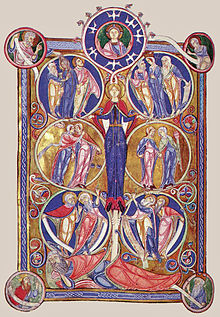Well, for example, I could say "Augustine said Mary sinless, so she was sinless".
But I'm not making that claim. The fact that Augustine--and Ambrose, Ephrem, etc--said Mary is sinless only suggests that this may be the case.
You just demonstrated the my first example of ATA.
Person A is an authority on a particular topic
Person A says something about that topic
Person A is
probably correct
I could use the same argument. For example, I could say " The fact that John Chrysostom said Mary was a sinner only suggests that this may be the case''
I think you have conformation bias.
But the real standard has three parts: Scripture, Tradition, and Magisterium, which cannot be separated.
They can be (and should be) separated if they are the traditions of men, Mark 7:8.
For example, Catholics believe in the assumption of Mary. They believe that Mary never saw death and was assumed bodily in heaven. The Eastern Orthodox church believes in the Dormition of Mary. They believe that Mary died then was bodily resurrected and taken up into heaven. Both claim tradition.
There were Latin Catholics saying that Eastern Catholics were not real Catholics for having different beliefs about the Assumption of Mary and Eastern Catholics trying to use this difference to show that Latin theology is flawed.
This shows that it's likely these beliefs about Mary were myths that people started to believe as fact including the fallible CF's.
The same thing still happens today. Goldfish have three second memories, bats are blind, sugar makes kids hyper. None of those are true but people believe them because they heard it from someone who seemed like they knew what they were talking about or kept hearing it so it must be true. Just watch shows like Mythbusters and Q.I. to see how many things people believe that are not true.
And the magisterium would be more appealing to authority.
When Protestants appeal to Scripture, they have a problem, since we know which books are in the Bible through the Catholic Tradition and Magisteriu, which holds that Mary is siness.
The bible does not say Mary was sinless. There are verses that point to her being sinful.
The catholic traditions of Mary are untrustworthy and contradictory. They appear in history many years after the time of Mary and there is no proof the twelve apostles of Jesus ever believed them.
They also have another problem, in that they are appealing to their own authority, because they are appealing to their own interpretation of Scripture, which could be wrong.
This is not true.
If any of you lack wisdom, let him ask of God, that giveth to all
men liberally, and upbraideth not; and it shall be given him. James 1:5
Which things also we speak, not in the words which man's wisdom teacheth, but which the Holy Ghost teacheth; comparing spiritual things with spiritual. 1 Corinthians 2:13
Knowing this first, that no prophecy of the scripture is of any private interpretation. 1 Peter 1:20
Appealing to our own authority would be against scripture.
For Catholics it's seems if you lack wisdom, you should ask of the pope and magisterium.
If the pope says the woman of Revelation is Mary (which is a private interpretation) you have to believe it.
The magisterium says its infallible but the only proof I've seen is them saying they're infallible. They're say they're infallible therefore they're infallible, which sounds like circular reasoning.
You're basically trusting in man and putting faith in them that they have the correct interpretation instead of using critical thinking which the bible tells us to do.
Thus saith the LORD; Cursed
be the man that trusteth in man, and maketh flesh his arm, and whose heart departeth from the LORD. Jeremiah 17:5

